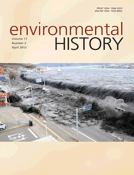Pritchard, Sara B. 2012. “An Envirotechnical Disaster: Nature, Technology, and Politics at Fukushima.” Environmental History 17: 219–243.
 In this essay Sara B. Pritchard critically examines two related analytical frameworks in the study of disaster and technology. Pritchard highlights the explanatory power of Charles Perrow’s influential conceptual tool “normal accident” and Thomas P. Hughes’s equally well-regarded notion “technological systems” as well as their shortcomings. Using the two ideas as a basis, Pritchard offers a new concept “envirotechnical system” to explain the events that took place at the Fukushima Daiichi plant in the wake of an earthquake, tsunami, and full meltdown of three of the six nuclear reactors at the Fukushima Daiichi nuclear power complex.
In this essay Sara B. Pritchard critically examines two related analytical frameworks in the study of disaster and technology. Pritchard highlights the explanatory power of Charles Perrow’s influential conceptual tool “normal accident” and Thomas P. Hughes’s equally well-regarded notion “technological systems” as well as their shortcomings. Using the two ideas as a basis, Pritchard offers a new concept “envirotechnical system” to explain the events that took place at the Fukushima Daiichi plant in the wake of an earthquake, tsunami, and full meltdown of three of the six nuclear reactors at the Fukushima Daiichi nuclear power complex.
Pritchard argues that the “triple disaster” can be usefully thought as an “envirotechnical disaster, a result of the convergence of natural and sociotechnical processes,” extending Perrow’s and Hughes’s analytical frameworks (220). She shows that in addition to figuring out and highlighting some significant sociotechnical factors of the disaster (e.g. Japan’s decision to build the nuclear complex to meet Japan’s energy demands), it is equally vital to understand how some environmental elements (water, air, human bodies, and nuclear radiations) played a role and were even enlisted to contain a more devastating disaster.
Her envirotechnical analysis is well informed by scholarship that is situated at the intersection of environmental history and history of technology. Additionally, her essay engages with concepts drawn from works on the studies of risk and disaster, enriching her examination of what transpired since the disaster occurred on March 11, 2011.
Finally, what makes her argument convincing is her critical and reflective discussion of her own conceptual framework, acknowledging a dire consequence of an envirotechnical analysis in absolving responsible parties of any guilt in a legal process. To address this issue, Pritchard discusses the role of power and politics at Fukushima, including claiming how economics can be “a powerful form of politics” (231). Related to this, she offers a relevant concept “envirotechnical regime [that] foregrounds the politics of [how the natural and the technological intersected at Fukushima], and how particular groups and institutions pushed for linking nature and technology in specific ways, both in situations of normalcy and those of crisis” (231).
For teaching purposes, this essay complements a PBS documentary Inside Japan’s Nuclear Meltdown (2012) and it would go well with many readings she cites in her essay. As a result, her 71 footnotes provide a valuable resource for anyone who wants to look in more detail the works she cites and to even draw up a syllabus for an undergraduate or graduate level seminar.
Anto Mohsin, Science and Technology Studies, Cornell University.
![[Teach311 + COVID-19] Collective](https://blogs.ntu.edu.sg/teach311/files/2020/04/Banner.jpg)